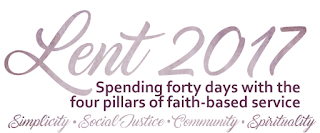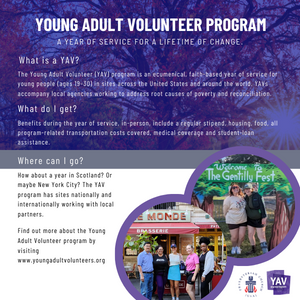By Greg Hamilton, currently serving with Jesuit Volunteer Corps
Today’s Gospel challenged my understanding of what it means to be compassionate. When Jesus learned that a loved one was ill, He responded in a peculiar manner. He didn’t rush to the sick one’s side or hurry to comfort His beloved’s family. Rather, He waited two days.
Why did He wait two days? I sure wouldn’t have done that. If He knew all along that He would raise Lazarus, why would He prolong the wounded agony of Mary and Martha? How could Jesus desert those He loved in their moment of need? It seems almost like a test, a cruel and unnecessary test.
Yet I suspect Jesus had a different intention. By waiting two extra days He was not punishing or testing Mary and Martha but inviting them to examine their own brokenness. The idea of resting in brokenness, rather than avoiding it, has been a particularly challenging concept for me. I first encountered it in Bryan Stevenson’s book Just Mercy, in which Stevenson says “We can embrace our humanness, which means embracing our broken natures and the compassion that remains our best hope for healing. Or we can deny our brokenness, forswear compassion, and, as a result, deny our own humanity.”
It seems that Jesus chose the former. When He finally arrived in Bethany and witnessed the woundedness of those He loved, He “became perturbed and deeply troubled.” Then, “Jesus wept.” Knowing that Jesus wept helps me reclaim my own brokenness and affirms that truly embodying compassion requires entering into the chaos of woundedness, both my own and that of the “other” person.
Prayer:
Focus on: Social Justice: How have you been wounded by the, as Dr. Martin Luther King Jr. puts it, “sickness of racism, excessive materialism, and militarism?” How can you – and your surrounding communities – enter into this brokenness and encounter healing compassion?
Service Inspiration: My mother, Sue, understands part of my volunteer experience, but struggles with other components. However, I recently babysat for a colleague’s children, a two-and-a-half year old and a six-month old. When I left, I was exhausted. I realized later that I watched two boys the same age difference as my brother and I, but only for a few hours. My mom did it for years, and then became my teacher and homeschooled us. She served as an enormous role model, never asking for thanks or recognition, silently taking on her children’s struggles. She is an inspiration and reminder of Jesus here on Earth.
Forty Days with the Four Pillars of Faith-Based Service: This reflection is part of our annual Lenten Reflection Guide, a collection of reflections written by current and former volunteers. We are pleased to offer this resource through our partnership with the Catholic Apostolate Center.
To download the Lenten Reflection Guide, please click here.
About the Author: Greg attended Saint Michael’s College in the grace-filled Green Mountain State of Vermont and is currently serving as a Jesuit Volunteer in Washington D.C. at the Campaign for the Fair Sentencing of Youth. Most days, Greg finds a way to involve his favorite poet, Mary Oliver, in his routine.




 Thousands of faith-based service opportunities can be at your fingertips with the RESPONSE. Download the latest edition today!
Thousands of faith-based service opportunities can be at your fingertips with the RESPONSE. Download the latest edition today!
